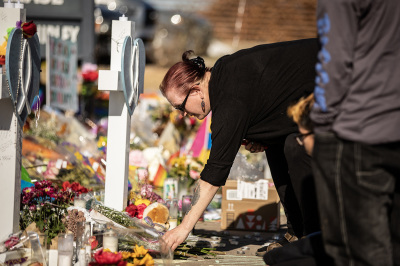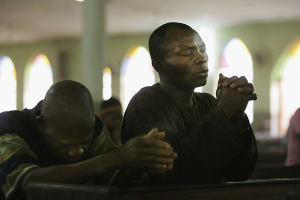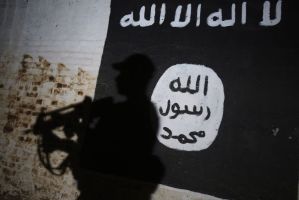'Stochastic terror': Truth is not violence

On Thanksgiving Day, the entrance to the Focus on the Family offices was vandalized. The perpetrators, referring to the recent mass shooting at Club Q in Colorado Springs, spray-painted “Blood is on your hands!” and “Five lives taken!” Additionally, they left a sign that quoted 2 Corinthians 11:14-15, implying that the organization did the devil’s work.
Two days earlier, an opinion piece in The New York Times also blamed Focus on the Family for the murders: “When I heard the news about the shooting at Club Q, an L.G.B.T.Q. nightclub in Colorado Springs, I couldn’t help but think of the rhetoric spewed by those like James Dobson.” Many other news reports, articles, opinion pieces, and tweets explicitly connected the shooting to Focus on the Family, other evangelical organizations, churches, and even the military bases of Colorado Springs.
The group who claimed responsibility for the vandalism never used the phrase “stochastic terrorism,” but their reasoning relied on it. Much of the media coverage, in fact, did employ this phrase that is now increasingly being used to direct blame. In this case, anyone who advocated against same-sex marriage, opposed LGBT advocacy in schools and libraries, or suggested that sexual orientation and gender confusion are not immutable identities is guilty of “hate speech” and complicit in this act of terrorism.
The shooter has no known connection with Focus on the Family. No one at Focus on the Family participated in or praised the violence. The man who did the killing appears to have been a member of the extended LGBTQ community and, like many other mass shooters, grew up alienated from his father in a terribly broken family. None of that matters to those who’ve already determined who the guilty parties are.
The word “stochastic” is an adjective that means “randomly determined; having a random probability distribution or pattern that may be analyzed statistically but may not be predicted precisely.” “Stochastic terrorism” is a recently invented phrase that has quickly become common vernacular, is assumed to be valid, and is now employed by politicians and pundits to blame predetermined good guys and bad guys. “Stochastic terrorism” suggests one does not actually have to support violence or be in any way linked to an act of violence to be responsible for it. Simply making an unpopular moral claim is enough to “create an environment” of violence.
The blame, as you might guess, goes only one way. Growing anti-religious sentiment is not behind church shootings, but it is clear who is to blame for the others. For example, CNN declared the attack at Club Q “wasn’t surprising. It came at a moment rife with anti-LGBTQ animus. Across dozens of mostly Republican-controlled states, lawmakers have passed or introduced a record number of anti-LGBTQ bills this year.”
Claiming to explain why an event happened, “stochastic terrorism” only obscures the real social and cultural issues we face. It dehumanizes people by removing moral agency, reimagining murderers and bystanders alike as unwitting victims of impersonal forces. Casting intellectual opponents as unthinking and amoral automatons, any responsibility we have to carefully think through or argue for a moral position is alleviated. In essence, “stochastic terrorism” is an inevitable stand-in for justice and moral reasoning in a culture captive to a critical theory mood.
Lurking beneath “stochastic terrorism” is a not-so-subtle suggestion that contemporary conversations should not be conversations at all, something recently noted in both Commentary and National Review. In a turn that Orwell warned us about, dissent is considered danger, words are violence, opinions are hate, and yesterday’s truths are today’s terror. Tragedies and crises become crass opportunities to promote a viewpoint. We need not prove our ideological enemy is guilty of a crime, only that they’re on the wrong side of history.
In the end, it’s a gnostic impulse, where identity markers are all that matter. Guilt or innocence, right or wrong, truth or falsehood are pre-determined by an intersectional hierarchy.
To be clear, words are powerful. They shape hearts and minds, and can lead both individuals and entire societies either toward eternal truths or away from them. In a culture so captive to a “critical theory mood,” the only right and loving response to the hijacking of language is to oppose falsehood and advance truth. This will mean, among other things, refusing to accept or use words and phrases like “stochastic terrorism,” which assume all kinds of false and dangerous ideas about who we are.
Originally published at Breakpoint.
John Stonestreet serves as president of the Colson Center for Christian Worldview. He’s a sought-after author and speaker on areas of faith and culture, theology, worldview, education and apologetics.
Timothy D. Padgett (PhD) is the Managing Editor of BreakPoint.org with the Colson Center for Christian Worldview. His focus is on cultural engagement, living out the Christian worldview, and the way Christians argue for diverse viewpoints while sharing a common biblical foundation?particularly regarding the relationship between church and state, Christ and culture, and war and peace.



























